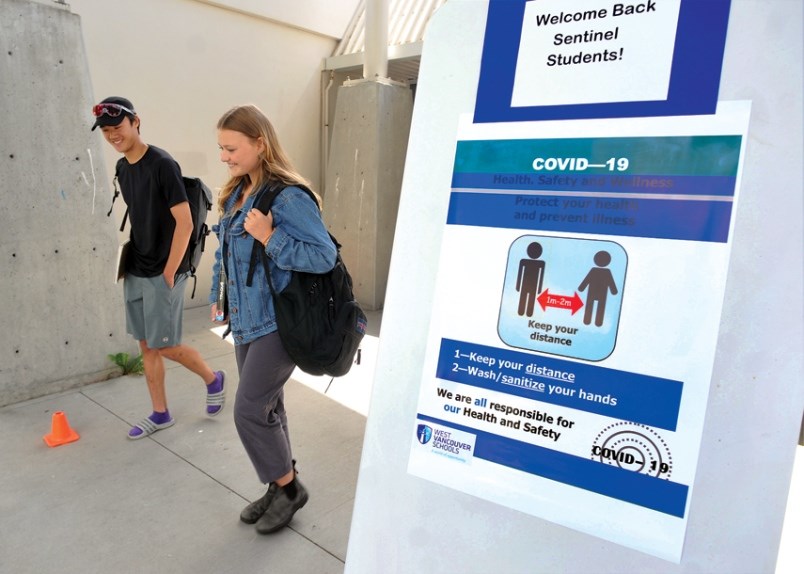Back to school will be a gradual process this September, and will now include several days of “orientation” for students and staff during the first week, Education Minister Rob Fleming announced Wednesday.
Most students will now return to school Sept. 10 instead of Sept. 8, according to the minister, to give teachers and staff two days to review health and safety information and plan for classes under the “new normal” of the COVID-19 pandemic.
Students will spend the first days of school finding out who is in their “learning group” and getting to know the new COVID-19 routines.
Fleming’s announcement walking back the start of classes by a few days comes after the province faced criticism from teachers that they had not been given any time to prepare for students’ return to school.
Schools on the North Shore reopened part-time in June for students in a voluntary capacity. But not all students attended in June. Some children haven’t been in a regular classroom since March.
School districts must submit their plans for restarting classroom instruction to the ministry by Aug. 17. Parents are to get more details on those plans Aug. 26.
Lisa Upton, principal of Carisbrooke Elementary in North Vancouver said Wednesday she’s excited about students coming back to school in September. Schooling in June went well, said Upton, and was a huge relief after spending mid-March through May in an empty school.
“To be honest, the best part for me was being with students again,” she said.
She added the school is planning to include a lot of outdoor learning in the fall.
Keith Rispin, a social studies teacher at West Vancouver Secondary, has more questions about the back-to-school plan.
Regardless of what happens, “We’ll make it work,” said Rispin.
“There’s people who are a whole lot smarter than me figuring out how it’s going to look like in the classroom,” he said.
So far, however, none of that information has been shared with teachers, he said.
Rispin also worries about the possibility of colleagues and students contracting the virus or bringing it back to vulnerable family members.
“If somebody gets sick, then what?” he said. “What risk are we putting them at?”
“I’d like to see a situation where there was a little more vigorous attention paid to masking and separation of students and staff.”
Patrick Heide, a retired secondary school teacher who lives in North Vancouver, said he’s been hearing similar concerns from his former colleagues.
Heide said on balance he thinks kids need to be back in the classroom, for both their academic learning and social well-being.
Heide said he spoke to his barber recently about the back to school plans who told him there’s only so much most parents can do to help their kids learn at home.
“Personally I think there’s more benefit being in school,” he said, adding most students aren’t getting the same level of support and feedback at home that they would at school.
But he said he sympathizes with parents and teachers. “There’s a learning curve that’s involved,” he said. “It’s the unknown.”

The province has faced mounting criticism in recent weeks for planning to re-open schools at a time when cases of COVID-19 have been rising in B.C., particularly from teachers, who say physical distancing won’t be possible in all classrooms.
But Dr. Bonnie Henry, the province’s medical health officer, has remained firm in her stance that going back to school is an important goal, especially when nobody knows how long the pandemic will last.
On Wednesday, B.C. Premier John Horgan called reopening schools “fundamental to re-establishing normalcy within our communities.”
Horgan said B.C. has learned from the partial school re-opening in June.
Measures like staggered break times, keeping groups smaller, limiting the number of people in a school and in hallways at one time remain the basis of the back-to-school plan. Schools are also considering measures like how to increase ventilation and moving some classes outside.
Opinion among parents on the back-to-school plan appears split. According to a recent Insights West poll, about half of parents polled favoured kids returning to the classroom and about half opposed it.
Most parents – 71 per cent - worried about their children’s social needs and isolation if they didn’t return to school. About 63 per cent also said the quality of online education was poor compared to classroom learning. Lack of childcare was also a concern for about half of the parents if kids didn’t return to school.
A return to school in September will be mandatory, meaning parents who choose not to send their children to school will have to register for distance education or home schooling.
The North Vancouver School District has a “distributed” or online learning program that allows students in grades 8 to 12 to take some courses online.
Usually there are between 2,600 to 3,000 students enrolled in the district’s program, according to Joanne Robertson, director of the program. Registration for the program is currently closed, although the school district may consider expanding the program this fall if staff is available.
West Vancouver does not have a distance education program.
Families can also register with a distance education program run by other schools districts or with private online schools or can home school their children.
Some families have voiced worries that if they withdraw this year from a school or program where there is currently a waiting list, they will lose their “place” in that program.
Both North Shore school districts indicated in cases of children with particular medical conditions, they will work with families on individual plans.



